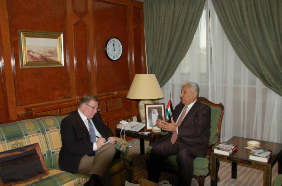"No peace in our time"
Of all the idiocies uttered in reaction to Benjamin Netanyahu’s stunning election victory, none is more ubiquitous than the idea that peace prospects are now dead because Netanyahu has declared that there will be no Palestinian state while he is Israel’s prime minister.
I have news for the lowing herds: There would be no peace and no Palestinian state if Isaac Herzog were prime minister either. Or Ehud Barak or Ehud Olmert for that matter. The latter two were (non-Likud) prime ministers who offered the Palestinians their own state — with its capital in Jerusalem and every Israeli settlement in the new Palestine uprooted — only to be rudely rejected.
This is not ancient history. This is 2000, 2001 and 2008 — three astonishingly concessionary peace offers within the past 15 years. Every one rejected.
The fundamental reality remains: This generation of Palestinian leadership — from Yasser Arafat to Mahmoud Abbas — has never and will never sign its name to a final peace settlement dividing the land with a Jewish state. And without that, no Israeli government of any kind will agree to a Palestinian state.
Today, however, there is a second reason a peace agreement is impossible: the supreme instability of the entire Middle East. For half a century, it was run by dictators no one liked but with whom you could do business. For example, the 1974 Israel-Syria disengagement agreement yielded more than four decades of near-total quiet on the border because the Assad dictatorships so decreed.
That authoritarian order is gone, overthrown by the Arab Spring. Syria is wracked by a multi-sided civil war that has killed 200,000 people and that has al-Qaeda allies, Hezbollah fighters, government troops and eventhe occasional Iranian general prowling the Israeli border. Who inherits? No one knows.
In the last four years, Egypt has had two revolutions and three radically different regimes. Yemen went from pro-American to Iranian client so quickly the United States had to evacuate its embassy in a panic. Libya has gone from Moammar Gaddafi’s crazy authoritarianism to jihadi-dominated civil war. On Wednesday, Tunisia, the one relative success of the Arab Spring, suffered a major terror attack that the prime minister said “targets the stability of the country.”
From Mali to Iraq, everything is in flux. Amid this mayhem, by what magic would the West Bank, riven by a bitter Fatah-Hamas rivalry, be an island of stability? What would give any Israeli-Palestinian peace agreement even a modicum of durability?
There was a time when Arafat commanded the Palestinian movement the way Gaddafi commanded Libya. Abbas commands no one. Why do you think he is in the 11th year of a four-year term, having refused to hold elections for the last five years? Because he’s afraid he would lose to Hamas.
With or without elections, the West Bank could fall to Hamas overnight. At which point fire rains down on Tel Aviv, Ben Gurion Airport and the entire Israeli urban heartland — just as it rains down on southern Israel from Gaza when it suits Hamas, which has turned that first Palestinian state into a terrorist fire base.
Any Arab-Israeli peace settlement would require Israel to make dangerous and inherently irreversible territorial concessions on the West Bank in return for promises and guarantees. Under current conditions, these would be written on sand.
Israel is ringed by jihadi terrorists in Sinai, Hamas in Gaza, Hezbollah in Lebanon, Islamic State and Iranian proxies in Syria, and a friendly but highly fragile Jordan. Israelis have no idea who ends up running any of these places. Will the Islamic State advance to an Israeli border? Will Iranian Revolutionary Guards appear on the Golan Heights? No one knows.
Well, say the critics. Israel could be given outside guarantees. Guarantees? Like the 1994 Budapest Memorandum in which the United States, Britain and Russia guaranteed Ukraine’s “territorial integrity”? Like the red line in Syria? Like the unanimous U.N. resolutions declaring illegal any Iranian enrichment of uranium — now effectively rendered null?
Peace awaits three things. Eventual Palestinian acceptance of a Jewish state. A Palestinian leader willing to sign a deal based on that premise. A modicum of regional stability that allows Israel to risk the potentially fatal withdrawals such a deal would entail.
I believe such a day will come. But there is zero chance it comes now or even soon. That’s essentially what Netanyahu said Thursday in explaining — and softening — his no-Palestinian-state statement.
In the interim, I understand the crushing disappointment of the Obama administration and its media poodles at the spectacular success of the foreign leader they loathe more than any other on the planet. The consequent seething and sputtering are understandable, if unseemly. Blaming Netanyahu for banishing peace, however, is mindless.

